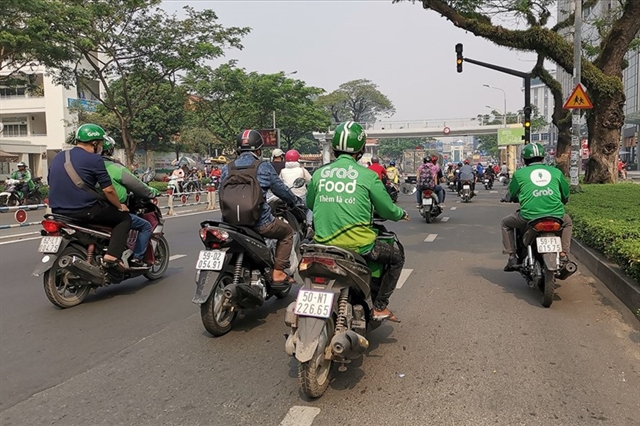Earlier this month the Government’s amendment of tax regulations for ride-hailing services, which increases the tax they actually pay, was a topic of hot debate in the media.

Earlier this month the Government’s amendment of tax regulations for ride-hailing services, which increases the tax they actually pay, was a topic of hot debate in the media.
With effect from December 5 ride-hailing firms have to pay value added tax (VAT) of 10 per cent on the fares passengers pay for a ride unlike earlier, when they only had to pay the 10 per cent on their revenue after paying the drivers’ 80 per cent share of the fare.
The drivers then paid 3 per cent VAT on their 80 per cent share.
Under the new tax regime, the effective rate is more than double the old one of around 4.4 per cent.
Drivers’ incomes are estimated to have fallen by around 7.3 per cent.
Policy makers said the changes are aimed at rationalizing the tax regime for ride-hailing companies, treating them as transporters to create a level playing field for traditional taxi firms.
For a long time it was not clear if ride-hailing companies were considered to be technology service providers or transport companies, but the new decree makes it clear they are the latter.
The ride-hailing market in Viet Nam saw substantial growth of 57 per cent between 2015 and 2019, the highest in South East Asia, Grant Thornton said, quoting a study by Google and Temasek.
This growth drew the attention of Vietnamese tax authorities, who have been making efforts to develop a mechanism to collect tax from tech-based drivers on incomes generated from the ride-hailing business, it said.
An official from the Department of Tax Administration for Small and Medium Enterprises and Individuals said VAT rates for ride-hailing companies like Grab and Gojek had so far been too low and tax authorities need to raise them to the correct level.
The 10 percent VAT rate would be appropriate for ride-hailing firms since they operate like transport companies, she said.
Many experts agree with the changes, saying the new tax regime creates a level playing field for ride-hailing firms and traditional taxi operators.
But the changes have led to other controversies as Grab, one of the biggest ride-hailing firms in Viet Nam, decided to hike fares.
On the same day the new decree to change the taxes took effect (December 5) it increased fares by 5-6 per cent, saying it wanted to protect drivers’ incomes.
Taxi fares in major cities and provinces like Ha Noi, Bac Ninh, HCMC, Binh Duong, Dong Nai and Can Tho went up by VND2,000 to VND27,000 for the first two kilometres.
In Hai Phong, Quang Ninh and Da Nang they rose by VND3,000 to VND25,000.
For each subsequent kilometre the fares were increased by VND500 – 1,000.
GrabBike fares increased from VND3,400 to VND4,000 per kilometre after the first two kilometres.
The company also decided to increase its commission on taxi fares from 28.3 per cent to 32.8 per cent, including an app service fee of 25 per cent.
For bikes, it increased from 25 per cent to 27.2 per cent, including an app service fee of 20 per cent.
The hikes in fares and commissions have sparked arguments among drivers, customers and experts.
Two days after Grab announced the changes hundreds of GrabBike drivers turned off their app and gathered outside the company’s office in Ha Noi to protest and demanding a return to the old rates.
Consumers
Nguyen Ngoc Nga of HCMC’s District 2 said she used Grabbike to go to office daily due to the convenience and promotions, which made the fares reasonable.
“I got a shock as my daily fare increased from VND40,000 to over VND50,000.” She said she was considering using public transport from now on.
Tran Thi Thu Hong of District 3 said to visit her daughter in District 1 the GrabCar fare is now VND45,000, VND9,000-10,000 higher than before.
“Most of us have seen incomes severely affected by the Covid-19 outbreak, and so we will have to reconsider the use of this service.”
Many other customers have been making similar comments and started comparing ride-hailing fares with traditional taxi and motorbike taxi services before booking.
Grab drivers
Drivers said the fare increase is likely to force customers to opt for competing services and business has already fallen significantly.
Nguyen Xuan Cang of Long An Province has worked as a Grab driver for more than a year in HCMC.
“I support the Government’s tax payment policy but I expect Grab to share the tax burden with drivers.
“We insist on Grab’s taking that the company should go back to the old 20 per cent commission rate. An increase of 2 or 3 per cent may be fine, but over 7 per cent as the company just did is too much.”
But a Grab spokesman blamed the Government’s new tax policy for reducing drivers’ incomes.
He told online newspaper VnExpress that if his company did not increase fares, drivers’ incomes would decrease by around 7.3 per cent, and the hike would keep it at just 1 per cent.
“The new fares still ensure Grab’s competitiveness in the market.”
The company also had plans for more promotions, he added.
According to Nguyen Thai Hai Van, general director of Grab Vietnam, Decree No.126 has a number of provisions that are not suitable for ride-hailing services, and this has contributed to increasing ride costs and affecting drivers’ incomes.
The country is going through a difficult time, and the new tax policy therefore has an impact not only on drivers but also customers and the company.
On December 11 Grab wrote to the General Taxation Department protesting against its decision to amend the VAT regime even for motorbike drivers.
It said Decree 10 that came into force in April covered only the automobile transportation business but not motorbike taxis.
The new VAT policy had badly affected Grabbike drivers’ incomes and many had stopped working in protest, it said.
What is the impact on other ride-hailing firms?
Viet Nam also has many other app-based motorbike taxi services like Gojek, Aber, FastGo, VATO, Mygo, and be Group JSC.
Five days after Grab adjusted its fares and commission rates, Gojek also announced fare and commission hikes for some of its services.
For instance, the fare for GoRide for up to two kilometres has been increased by VND1,000 to VND13,000 in Ha Noi, and VND11,000 in HCMC.
Analysts say people pay the 10 per cent VAT on all kinds of goods and services, including traditional taxi services, and so the 10 per cent VAT for ride-hailing services like Grab is nothing out of the ordinary.
They only had reservations about the timing, saying most sectors are struggling to cope amid the downturn caused by the COVID-19 pandemic, and so there has been a sharp increase in joblessness and decrease in people’ incomes.
So a tax hike that causes a spike in the price of any product or service will simply make people stop spending on it, they point out.
It has been going on for nearly a month but the last of the story has not been heard yet. — VNS





